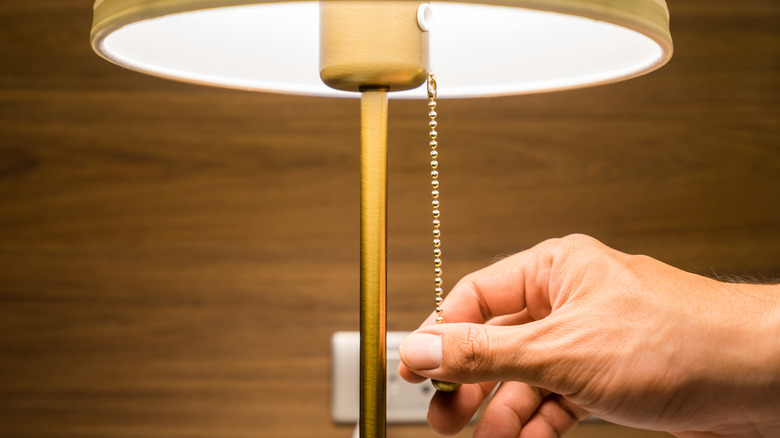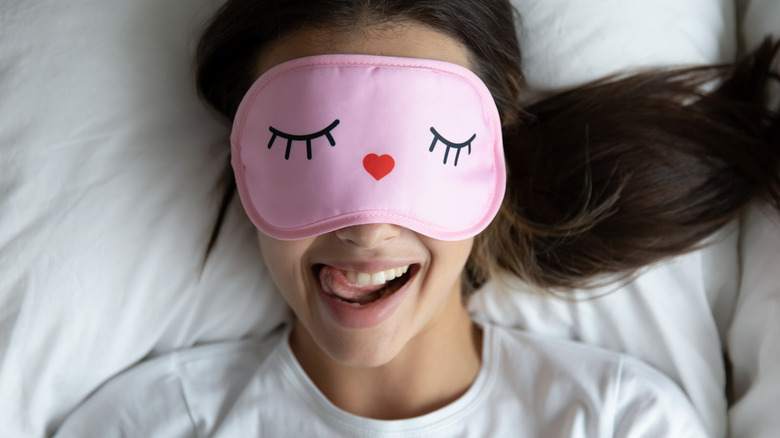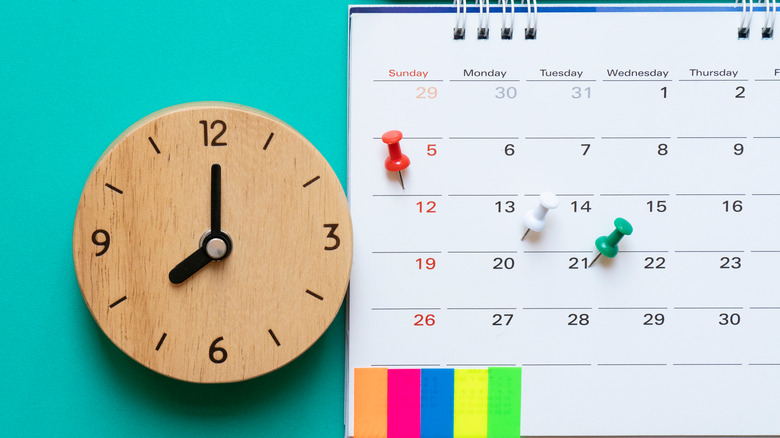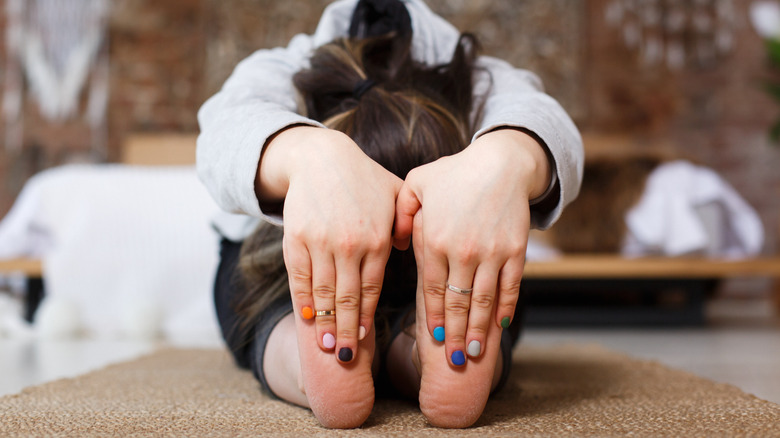Nighttime Habits That Can Help You Lose Weight
If you could lose weight by simply changing your nighttime habits, would you? If it sounds too good to be true, rest assured that it isn't. Diet and exercise have been the two key components of successful weight loss. However, sleep is just as important as the things you do before you go to bed (via Eating Well).
While you might think that what you do at the end of your day won't affect whether or not you'll lose weight, the habits you choose can in fact have a huge impact. Nighttime can be a bad time for people who tend to scroll through social media and binge eat while watching their favorite TV shows. Some people like to eat a late dinner or have a few cocktails before bed, too (via EatThis). These unhealthy habits can make it hard to lose weight.
If you're thinking about losing weight, it's time to turn off the lights on these bad habits and start implementing some healthy new habits.
Get enough sleep
If you're trying to lose weight, then you should consider looking into your sleep habits, says Healthline. Getting less than the recommended amount of sleep each night can increase your chances of weight gain and obesity. It may also increase your desire to eat more high-calorie foods. The Centers for Disease Control and Prevention (CDC) recommends that adults aim for at least 7 hours or more of sleep each night. Meanwhile, children and adolescents should get 8 to 10 hours of sleep per night to maintain a healthy lifestyle.
Getting enough sleep is one of the easiest and most effective ways you can lose weight. In one study published in the Annals of Internal Medicine, dieters who got 8.5 hours of sleep lost twice as much fat as those who only got 5.5 hours of sleep, even though they were all on the same reduced-calorie diet. That goes to show that an adequate amount of sleep each night can have a huge impact on how much weight you lose.
Sleep in a cool, dark setting
An easy nighttime habit that can help you lose those pounds is to simply turn the lights off and sleep in a cool, dark setting. Keeping the lights on can affect your circadian rhythm (which regulates your metabolism) and can increase the chances that you'll gain weight (via Sleep Foundation). If you turn your lights off, you have a better chance of losing weight.
According to a study in the American Journal of Epidemiology, women who slept in dark rooms were less likely to be obese than women who slept in lighter rooms. They also found that bright lights coming through your windows and even a normal amount of room light has been found to reduce melatonin secretion and interfere with your sleep quality. So if you want to maximize the benefits of sleeping in a dark room, be sure to dim the lights and close your drapes before you sleep.
If you want to lose weight, try lowering the temperature, too. A study cited by the National Institutes of Health (NIH) found that individuals who kept their bedroom temperature at a constant 66 degrees for one month not only boosted their metabolism by 10%, but also increased the amount of calorie-burning brown fat by up to 42%.
Limit your caffeine intake
If you're like most people, you probably love your caffeine in the morning. However, if you're a lover of caffeine in the evening, it may be time to rethink this nighttime habit.
"Drinking coffee before bed may put you at a disadvantage if you want to get restful sleep," according to Healthyfully. As it turns out, caffeine can remain in your body for up to 6 hours after it's consumed, per a study in the Journal of Medical Sleep Medicine. This can have a significant impact on your sleep, and as you've learned earlier, good quality sleep can help you shed those extra pounds.
If you're trying to lose weight and don't want to give up drinking caffeine, try to limit your intake to the beginning of the day and have no more than the recommended amount — 400 milligrams per day (about four or five cups of coffee), says the U.S. Food and Drug Administration (FDA).
Keep hydrated earlier in the day
You've probably heard it before, but hydration is key when it comes to weight loss (per Medical News Today).
According to the National Academies of Sciences, Engineering, and Medicine, women should ideally get a total of 2.7 liters (91 ounces) of fluid per day, while men should consume an average of 3.7 liters (125 ounces) daily. To get a better sense of how much water you actually need, you can try Everyday Health's hydration calculator. This can help you determine your water goal, so you can spread it out throughout the day.
If you think drinking water directly before bedtime is disrupting your sleep, then avoid drinking water or any other fluids for about two hours before bedtime. This can prevent you from waking up so much (via Healthline). Sleep is an important component of losing weight, so hydrating earlier in the day versus right before bed can help you get the rest you need to shed those pounds.
Stop snacking in bed
Those late-night snack sessions that you have in bed while binge-watching your favorite Netflix show may be the reason you're not losing weight.
According to WebMD, there has been a longstanding association between gaining weight and eating at night. Those after-dinner snacks usually consist of high-calorie foods like chips or candy, and when they are eaten in front of a television, it's easy to consume an entire bag or container and not even realize it. Emotional eating is another factor that may lead to your poor food choices at night. A study in the journal Minerva Endocrinologica notes that foods that are high in sugar or fat, also known as "comfort foods," are often eaten as a form of self-medication to help dispel stress.
"When you're trying to lose weight, eat regular meals and consume 90% of your calories before 8 p.m.," says WebMD. Choose a healthy 100-calorie snack after dinner or a packaged portioned control snack to help curb hunger, so that you can stop your habit of snacking in bed.
Drink less alcohol
If you're prone to having a nightcap before bed and you're trying to lose weight, then you may want to consider limiting your intake of alcohol (or stopping altogether).
An evening cocktail may sound relaxing, but when it comes to losing weight, it can just add extra calories to your daily total, as well as disturb your sleep. "Alcoholic drinks are often referred to as 'empty' calories. This means that they provide your body with calories but contain very little nutrients," states Healthline. It can also lower your inhibitions, which can lead to poor food choices. Those extra calories before bed end up being stored as fat in your body.
Alcohol can also disturb your sleep. A paper published in the National Institute on Alcohol Abuse and Alcoholism noted that alcohol can lead to you waking up more often while you sleep. This sleep deprivation can then lead to a hormone imbalance that's related to your hunger and how satiated you are. That said, if you're trying to lose weight and you really want to enjoy a cocktail before bed, just don't make it a nightly habit.
Put away your iPhone
Scrolling through your phone before you go to bed may not be the best idea if you're trying to achieve your weight loss target.
According to a study published in the journal PLOS One, the authors found that the bright light exposure you're getting from your smartphone may affect your weight. Researchers set out to explore how exposure to light affects a person's metabolism, and whether it made a difference in the morning or at night. Researchers found that bright light did indeed alter participants' metabolic function by increasing their insulin resistance. They also found that nighttime exposure led to higher blood sugar levels (glucose). Over time, higher levels of blood sugar can lead to excess body fat.
If you want to keep your weight in check, then ditch the phone a few hours before jumping into bed and try reading a book or listening to music instead.
Work out earlier
If you're one to skip the gym in the morning in place of working out before you jump into bed, you may want to rethink your exercise schedule, as it may affect your sleep.
Without a doubt, sleep is a key element to keeping those pounds off. As Integrative Health and Wellbeing expert Adam Perlman told Men's Journal, "In general, exercise is good for helping people to sleep better." However, he said that many people find it hard to fall asleep when they work out close to bedtime because of the stimulating nature of physical exercise. He suggests exercising at different times of the day to see how it affects your sleep.
If nighttime is the only chance you get to break a sweat, then know that completing your workout at least an hour before bedtime is absolutely essential, per Healthline. "If possible, aim to finish at least 90 minutes before you head to bed. This will give your body enough time to wind down." Try a light activity like yoga, stretching, or taking a walk.
Go to bed early
When you're on a diet, changing the behaviors that got you those extra pounds may be hard to do. However, a nighttime habit that many of us can (and likely should) get on board with is going to bed a little earlier.
Sleep specialists recommend that adults get 7 to 9 hours of sleep per night for over health and well-being ( per Sleep Foundation). It can also help you lose weight. "When you get enough sleep, your body produces a satiety hormone, leptin, which naturally curbs your appetite," says Psychology Today. On the flipside, getting only 6 hours of shut-eye a night can increase your chances of becoming obese by a staggering 25% compared to someone who gets the recommended 8 hours.
A 2022 study published in JAMA Internal Medicine found that an extra hour of sleep each night can help sleep-deprived people who are overweight in losing weight. Participants in the study were asked not to restrict calories, and still ate fewer than 270 calories without even trying. As lead study author Dr. Esra Tasali told Everyday Health, "A decrease of 270 calories a day is tremendous. This is clinically important, and it's also highly significant for people on weight loss programs."
Eat and sleep on a schedule
Timing is everything. If you're in the habit of eating late and sleeping late, would you change that if you knew it could help you lose weight?
As it turns out, there may be benefits to eating and sleeping on a schedule to maximize your weight loss. Dr. Frank A.J.L. Scheer, Associate Professor of Medicine at Harvard Medical School, told the Food Network, "It is not just important what we eat, but also when we eat, and this can be traced back mostly to the tight reciprocal connection between the circadian clock and metabolism." Your circadian rhythms influence when you fall asleep, wake up, and even your eating habits, and are also affected by the light and the dark (via NIH). Working with these natural rhythms can help support your weight loss.
To keep your body on a healthy sleep schedule, go to bed and wake up at the same time each day. You can also try to limit your exposure to light before bedtime to get a better night's sleep. Like a sleep schedule, you can also align your eating habits to your circadian rhythms. Aim for a balanced eating schedule to help with weight loss instead of late-night eating (via Jenny Craig).
Keep dinner light
If you're in the habit of eating a large dinner close to bedtime, research suggests trying a new habit or opting for a larger breakfast and smaller dinner instead.
A study published in the Journal of Clinical Endocrinology & Metabolism found that heavy breakfast eaters have a better chance of losing weight and are more likely to burn up to two and a half times more calories than those who don't eat breakfast. Researchers recommend eating a larger breakfast rather than a large dinner to help reduce body weight.
The time you eat dinner may also affect your ability to burn fat. If you're used to eating dinner at 10 p.m. or later, you may want to reconsider. Another study published in the Journal of Clinical Endocrinology & Metabolism found that eating dinner at 10 p.m. versus eating at 6 p.m. may affect your blood glucose and ability to burn fat. Registered dietitian Lisa K. Diewald told Healthline that busy people usually rush through breakfast and eat later. She said, "[This] can leave you yearning for a large meal late at night, which as this study highlights can result in some difficulties with glucose or fat metabolism, even in young individuals with a healthy weight." Focus on a larger breakfast and try to keep your dinner light.
Drink non-caffeinated tea
If you drink a glass of wine as your nightcap, try replacing that with a non-caffeinated tea like hibiscus tea to help you with weight loss. A study in the journal Food & Function gave overweight and obese participants hibiscus extract for 12 weeks. At the end of the study, researchers found that the participants who drank tea reduced their body weight, BMI, body fat, and waist-to-hip ratio compared to the control group.
Herbal teas are also said to help with weight reduction and fat loss (via Healthline). A study in the Journal for Nurse Practitioners says that herbal teas can support weight loss and reduce one's chances of making poor dietary choices. The researchers also suggest using herbal teas as soup stock to enhance the weight loss value of the soup.
Replacing high-calorie beverages with a cup or two of a non-caffeinated tea before bedtime, as well as sticking to a healthy diet and regular exercise regime, can help you boost weight loss and prevent belly fat (per Healthline).
Try yoga
Incorporating yoga into your nighttime routine may not only help you sleep but also help you lose weight, says Healthline.
According to the site, establishing a steady yoga routine can not only aid in weight loss, but can also enhance sleep quality. Additionally, a pre-bedtime yoga session can improve the quality of your sleep, which in turn can be a boon for dieters and people monitoring their weight. You may also become more mindful of what you eat as a result.
If you have no time for exercise during the day, yoga may be a good habit to try in the early evening. Healthfully suggests choosing relaxing poses closer to bedtime rather than poses that will increase your energy. They suggest that the best poses for weight loss before bedtime are Uttanasana (standing forward bend), Savasana, or a Corpse pose. Yoga creates long, lean muscles. "The strengthening and lengthening aspects of evening yoga practice help you to lose weight while you sleep."
Start a food diary
If you're looking to adopt a new nighttime habit that'll help you lose weight, experts recommend starting a food diary.
A food diary can encourage you to eat fewer calories, which will in turn help you lose weight (per WebMD). A study published in the journal Obesity found that participants who recorded their daily dietary intake using a web-based program ended up losing about 10% of their body weight after the first month. It took them an average of 23 minutes a day to self-monitor during the first month. By the end of the study (after 6 months), that dropped to about 15 minutes per day. As lead study author Jean Harvey told Healthline, "We were not surprised that frequent self-monitoring was related to weight loss success. We were surprised that 15 minutes a day is all that's necessary."
If you think about it, you probably spend more than 15 minutes a day scrolling through social media. So if you just commit to writing in your food diary 15 minutes each night before going to bed, you'll have no trouble starting a new healthy habit that can help you lose weight.















